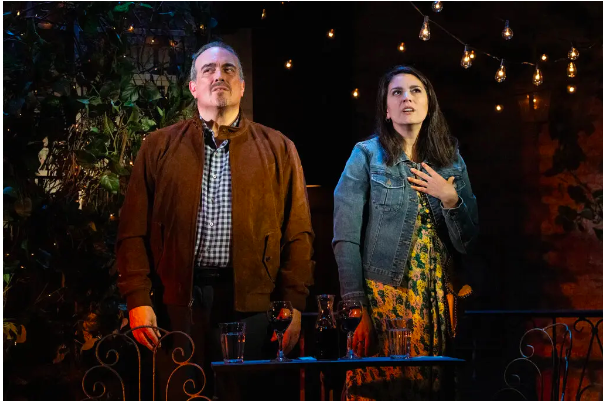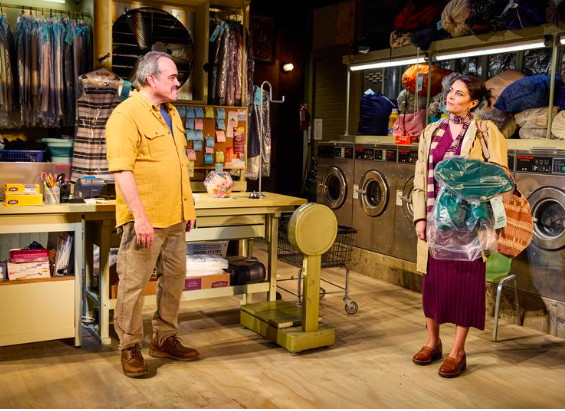Brooklyn Laundry
David Zayas and Cicely Strong share mushrooms while on a date.
April 9, 2024
Brooklyn Laundry, the new play in performances Off-Broadway, should come with a warning: run on gentle. Ideally, the most gentle cycle possible.
John Patrick Shanley’s world premiere at Manhattan City Center attempts to be a robust romantic comedy that sparks in the unlikely location of a laundromat. Instead, it is a whisper-thin attempt at a family drama, with a romance shoehorned in.
The unlikely suitor is Owen, played by the consistently charming David Zayas. To Fran (Cicely Strong)’s surprise, he invites her to dinner after the two engage in a snappy back and forth when she drops off her laundry at his Bushwick outpost.
Fed up with her studio apartment and unfulfilling job, Fran is smarting from a recent breakup – hence her small bag of laundry – and hardly receptive to Owen’s upbeat observations about her life. She’s burdened with family obligations and is unimpressed by Owen’s happy-go-lucky attitude. An example: He may have broken his back in a car accident, but the money from the settlement financed his seemingly successful laundry business.
Fran accepts Owen’s invitation to dinner, and, in an attempt to alter her outlook, she arrives high on mushrooms. Owen partakes as well and the two engage in philosophical banter that allows Strong’s comedic timing to shine.
While charming, the scene does not strengthen the bond between the pair, and a romantic connection is nowhere in sight. It’s difficult to picture this relationship blooming, and when Fran refuses to leave town for a week, fearful of the relationship fading or Owen finding someone else, it’s even more difficult to understand her anxiety.
It’s Fran’s ailing sister, Trish (Florencia Lozano), who needs her to travel; she is sick and rapidly approaching the end of her life. Lozano is a powerful presence onstage, but it’s to the detriment of her character – her voice is much too robust for someone who is at death’s door. Fran’s family tragedy compounds when her other sister Susie (a strong Andrea Syglowski) shares her own medical diagnosis.
Played with natural charm by Strong, Fran is a sympathetic character. It’s easy to relate to an exhausted New Yorker who wants to better her life but doesn’t know where to start. One questions why Shanley heaps so much misery on her character, but it seems to serve the purpose of justifying the play’s disappointingly trite, tiresome ending.
Shanley’s script frequently requires the willing suspension of disbelief. Audiences are supposed to accept that neither of Fran’s sisters made arrangements for their children, even while knowing they were going to die. Even less conceivable is the idea that Fran would accept her sister’s demands with little thought of their feasibility or effect on her own life. Shanley never addresses Fran’s ability to adopt several children on her salary, living in her studio apartment, or how the children will fare in this seemingly careless arrangement.
But even more unbelievable is the point of the entire show. The romance between Fran and Owen never feels authentic, especially at the play’s climax. Gone is the charming and generous man; instead, Owen refuses to let go of his anger that Fran took more than a week to return a text – immediately after the death of her sister. Even worse, Fran succumbs to his manipulations.
The entire story felt regressive, and I wondered if Shanley received any feedback from women or female-identifying characters while writing or workshopping the play. It’s possible the production would have improved if someone else had directed, offering Shanley some distance from his work.
For a romantic comedy to succeed, the audience has to want the two characters to be together. Instead, I would have cheered if Fran dumped Owen and left town, or at least found a new laundromat. Shanley’s inconsistent character development lags at times and rushes forward at others, careening into a conclusion that implies Fran will only find true happiness with Owen, a man she has known for a few weeks.
During what is supposed to be a romantic moment, Fran tells him, “You gotta excuse me, but I gotta say it. You’re a man, Owen. I didn’t even know what that was, but here you are. You’re a man. And I mean that like forever.”
Is that supposed to be a compliment? A guarantee that Fran will live happily ever after? Whatever it is, it’s disappointing and outdated – just like this play. And I mean that, like, forever.


